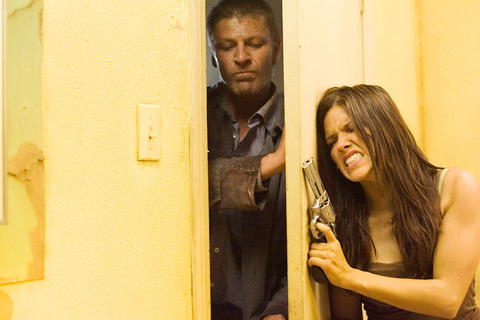The Hitcher isn't shy about declaring its intentions. The opening image is of a jackrabbit crossing a desert highway and being pulped by a car. Soon after, the vacationing young hero, Jim (Zachary Knighton), asks his girlfriend, Grace (Sophia Bush), to hold the wheel of his 1970 Oldsmobile 442 so he can hang out of the driver's side window and clean a splattered bug off the windshield. Message: Roadkill comes in all shapes and sizes.
Like the same-titled 1986 cult movie, this remake fuses elements of The Terminator, the Twilight Zone episode with the phantom hitchhiker, and Steven Spielberg's desert chase Duel. Dave Meyers, directing his first feature, and his three screenwriters (including Eric Red, who wrote the original) have conceived the tale as a crash-and-burn action-horror film with intellectual pretensions.
As the mass-murdering, hero-framing title character, the British actor Sean Bean brings parched charisma, a nondescript "American'' accent and an overachiever's commitment to nuance. In the original, Rutger Hauer's lip-smacking baddie was Satan with a driver's license. Bean's version plays like the murderous hero of Crime and Punishment reimagined as a wraithlike stalker. He's a sadistic philosophical theorist, mucking with people who didn't get the memo saying God is dead.

PHOTO COURTESY OF PANASIA
His victims include a family whose bumper sticker identifies them as evangelicals. When Jim and Grace inspect the Hitcher's butchery, the scene ends with a close-up of a bloodied Sunday school booklet titled "Will I Go to Heaven?'' Later, asked "Why'd you do it?'' the Hitcher replies, "Why not?''
The remake preserves many of the original's notorious set pieces, including a showstopper in which the cab and trailer of an 18-wheeler are used as a torture rack. The mix of mystical solemnity and chain-reaction slapstick suggests a Road Runner cartoon directed by John Woo (吳宇森). This is the kind of film in which the heroes often have the evildoer dead to rights but fail to pull the trigger, ostensibly because they're prisoners of bourgeois morality, but really because if they did the smart thing, the film would be a short subject.
The movie genuflects toward pop depth in a scene where Grace sprawls on a motel bed watching Alfred Hitchcock's Birds, another thriller about implacable, undefined evil, but there's a difference between refusing to give viewers the answers and having nothing to say. For all its death-metal vigor, The Hitcher falls into the latter camp.

This year will go down in the history books. Taiwan faces enormous turmoil and uncertainty in the coming months. Which political parties are in a good position to handle big changes? All of the main parties are beset with challenges. Taking stock, this column examined the Taiwan People’s Party (TPP) (“Huang Kuo-chang’s choking the life out of the TPP,” May 28, page 12), the Democratic Progressive Party (DPP) (“Challenges amid choppy waters for the DPP,” June 14, page 12) and the Chinese Nationalist Party (KMT) (“KMT struggles to seize opportunities as ‘interesting times’ loom,” June 20, page 11). Times like these can

June 23 to June 29 After capturing the walled city of Hsinchu on June 22, 1895, the Japanese hoped to quickly push south and seize control of Taiwan’s entire west coast — but their advance was stalled for more than a month. Not only did local Hakka fighters continue to cause them headaches, resistance forces even attempted to retake the city three times. “We had planned to occupy Anping (Tainan) and Takao (Kaohsiung) as soon as possible, but ever since we took Hsinchu, nearby bandits proclaiming to be ‘righteous people’ (義民) have been destroying train tracks and electrical cables, and gathering in villages

Dr. Y. Tony Yang, Associate Dean of Health Policy and Population Science at George Washington University, argued last week in a piece for the Taipei Times about former president Ma Ying-jeou (馬英九) leading a student delegation to the People’s Republic of China (PRC) that, “The real question is not whether Ma’s visit helps or hurts Taiwan — it is why Taiwan lacks a sophisticated, multi-track approach to one of the most complex geopolitical relationships in the world” (“Ma’s Visit, DPP’s Blind Spot,” June 18, page 8). Yang contends that the Democratic Progressive Party (DPP) has a blind spot: “By treating any

Swooping low over the banks of a Nile River tributary, an aid flight run by retired American military officers released a stream of food-stuffed sacks over a town emptied by fighting in South Sudan, a country wracked by conflict. Last week’s air drop was the latest in a controversial development — private contracting firms led by former US intelligence officers and military veterans delivering aid to some of the world’s deadliest conflict zones, in operations organized with governments that are combatants in the conflicts. The moves are roiling the global aid community, which warns of a more militarized, politicized and profit-seeking trend